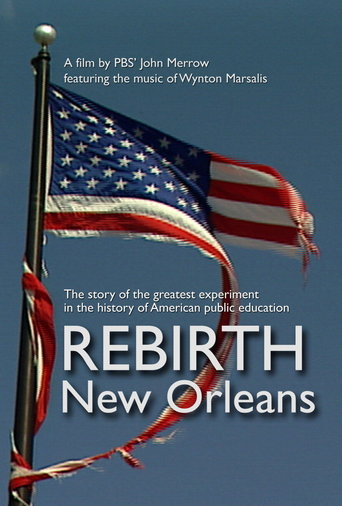Ella-May O'Brien
Each character in this movie — down to the smallest one — is an individual rather than a type, prone to spontaneous changes of mood and sometimes amusing outbursts of pettiness or ill humor.
TxMike
New Orleans is dear to my heart. It was the first city I visited as a boy in the 1950s. My sister used to live there, I once lived in the New Orleans suburbs of Kenner. I have good friends who are from New Orleans. So Katrina and its devastation was a difficult event to get past. Things got so bad that many life-long residents moved away because the city seemed headed in the wrong direction, in both education and politics. This documentary focuses on the New Orleans school systems, at Katrina time and before most probably the lowest-ranking school system in the whole USA. I recall news about one particular student in recent years who was Valedictorian of her senior class but couldn't graduate because her education level was so low that she could not pass the state achievement test to allow her to graduate. That student and her plight is part of this film.Hurricane Katrina devastated the New Orleans schools, they had to be closed and most buildings were in ruin. So it was surprising when one of the officials involved in the rebuilding said that "it was the best thing to happen to the school." What he meant was, the system had gotten into such a bad rut that only a complete overhaul and re-start could get schools where they need to be, in terms of achievement and graduation rates.Since they had nothing they had the luxury of performing great experiments. The gist of it was to establish charter schools that would still be free to the students but each charter school had flexibility to determine how it would operate. Many young teachers were hired from all over the USA and each charter school chosen, after a very rigorous screening process (maybe 15% of applicants were approved), knew they had 5 years to make it work or they were out and a different set of administrators and teachers would be given the school.As with all real-world experiments, some of it worked and some of it didn't. However one statistic shows that in the present New Orleans has 90% charter schools and as a group the students are performing measurably better than the non-charter schools, and better than the whole of Louisiana schools.Part of the issue is trying to apply educational techniques that have worked in other parts of the country. As the film points out, many of the teenagers, some 2 to 3 years behind, were raised around violence and crime, many have a difficult time accepting and adapting to newer ways of education and classroom behavior. What it seems to me is most of those already hardened or discouraged will be lost, to poverty or crime or both. But my hope is the younger students will latch onto the improvements and in time, maybe after another 5 to 10 years go by, will be normal, highly-motivated, high-achieving students.All this has thrown a bucket of vinegar into the honey. Part of the post-Katrina education overhaul was to fire ALL the teachers, and only a small percentage were hired back. Lawsuits were filed, the dismissed teachers apparently won, and it is not clear what long-term effect that will have.A very well-made film of a very important subject. Even for those who have never been to New Orleans.

